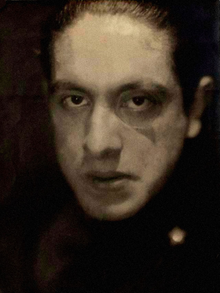Julius Evola
| Julius Evola | |
|---|---|

Evola during 1920s
|
|
| Born |
Giulio Cesare Andrea Evola May 19, 1898 Rome, Italy |
| Died | June 11, 1974 (aged 76) Rome, Italy |
| Cause of death | Respiratory-hepatic problems |
| Nationality | Italian |
| Notable work |
Theory of the Absolute Individual (1927) The Hermetic Tradition (1931) Revolt Against the Modern World (1934) The Mystery of the Grail (1937) Synthesis of the Doctrine of Race (1941) The Aryan Doctrine of Battle and Victory (1941) Orientamenti (1950) |
| Website | www |
| Era | 20th century |
| Region | Western philosophy |
| School |
Traditionalism Actual idealism |
| Institutions | School of Fascist Mysticism |
|
Main interests
|
History, religion, esotericism |
|
Notable ideas
|
Fascist mysticism, spiritual racism |
Baron Giulio Cesare Andrea Evola (Italian pronunciation: [ˈɛːvola]; 19 May 1898 – 11 June 1974), better known as Julius Evola (/ˈdʒuljəs ɛˈvoʊlə/), was an Italian philosopher, painter, and esotericist. According to the scholar Franco Ferraresi, "Evola’s thought can be considered one of the most radical and consistent antiegalitarian, antiliberal, antidemocratic, and antipopular systems in the twentieth century. It is a singular (though not necessarily original) blend of several schools and traditions, including German idealism, Eastern doctrines, traditionalism, and the all-embracing Weltanschauung of the interwar konservative Revolution with which Evola had a deep personal involvement."
Historian Aaron Gillette described Evola as "one of the most influential fascist racists in Italian history." Evola was admired by the Italian Fascist leader Benito Mussolini. He idolized the Nazi SS and admired the SS commander Heinrich Himmler, whom he knew personally, and spent World War II working for the Nazi intelligence agency. In a trial in 1951, Evola, who denied being a Fascist, referred to himself as a ‘superfascist’. Concerning this statement, historian Elisabetta Cassina Wolff wrote that "It is unclear whether this meant that Evola was placing himself above or beyond Fascism."
...
Wikipedia
